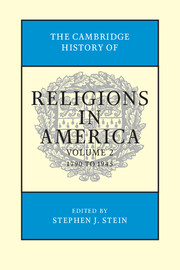Book contents
- Frontmatter
- Contents
- Contributors
- Editor's Introduction
- SECTION I RELIGION IN NORTH AMERICA
- SECTION II RELIGIONS IN THE NEW NATION, 1790–1865
- 5 Religious Organization in the New Nation
- 6 Religious and Geographical Expansion, 1790–1865
- 7 Theological Controversies, 1790–1865
- 8 Religion and Conflict from Independence to the Civil War
- 9 African Americans and the Making of Evangelical Christianities, 1760–1860
- 10 Religion and the Civil War
- SECTION III CHANGING RELIGIOUS REALITIES
- SECTION IV RELIGIOUS RESPONSES TO MODERN LIFE AND THOUGHT
- SECTION V COMPARATIVE ESSAYS
- SECTION VI RELIGION AND DIVERSE AREAS
- Index
- References
7 - Theological Controversies, 1790–1865
from SECTION II - RELIGIONS IN THE NEW NATION, 1790–1865
Published online by Cambridge University Press: 28 July 2012
- Frontmatter
- Contents
- Contributors
- Editor's Introduction
- SECTION I RELIGION IN NORTH AMERICA
- SECTION II RELIGIONS IN THE NEW NATION, 1790–1865
- 5 Religious Organization in the New Nation
- 6 Religious and Geographical Expansion, 1790–1865
- 7 Theological Controversies, 1790–1865
- 8 Religion and Conflict from Independence to the Civil War
- 9 African Americans and the Making of Evangelical Christianities, 1760–1860
- 10 Religion and the Civil War
- SECTION III CHANGING RELIGIOUS REALITIES
- SECTION IV RELIGIOUS RESPONSES TO MODERN LIFE AND THOUGHT
- SECTION V COMPARATIVE ESSAYS
- SECTION VI RELIGION AND DIVERSE AREAS
- Index
- References
Summary
On 15 August 1790, American history was made in an unlikely corner of southern England, at an estate owned by a prominent family of Catholic dissenters. Though old British penal laws still officially prohibited public celebrations of the Mass, a crowd packed the Chapel of St. Mary's at Lulworth Castle to receive the sacrament and witness the consecration of John Carroll as the first Catholic bishop to the United States. Born into Maryland's landed gentry and schooled among English refugees in France, Carroll became the superior of Rome's missions in the infant American nation in 1784 and quickly distinguished himself as an energetic administrator. In his new role as bishop of Baltimore, a diocese effectively coterminous with the thirteen original United States, he was in charge of perhaps thirty-five priests in widely scattered parishes, many of them in locales formerly hostile to “papists.” Such hostility had once been evident in Boston, for example, where a small Catholic congregation by 1790 was gaining Irish parishioners. In 1732, when the rumor spread that a Catholic cleric was in town to celebrate a St. Patrick's Day mass, Governor Jonathan Belcher invoked the local antipriest law in dispatching the Suffolk County sheriff on a futile house-to-house search. Decades later in New York, the old canard of a Romanist fifth column found new life in anti-Catholic attacks by the Federalist newspaper Gazette of the United States (1789), prompting Carroll to rebut that Catholics were not enemies of religious liberty.
- Type
- Chapter
- Information
- The Cambridge History of Religions in America , pp. 137 - 157Publisher: Cambridge University PressPrint publication year: 2000



